#ecocide
Text
youtube
#free palestine#palestine#free gaza#gaza#gaza genocide#gaza strip#israel#from the river to the sea palestine will be free#israel is a terrorist state#free 🍉#agent orange#ecocide#palestinian genocide#stop genocide#israeli war crimes#Herbicidal Warfare#Republicans don't understand shit#fuck republikkkans#fuck republicans#stop ecocide#stop rosebank#Youtube
21 notes
·
View notes
Text
Excerpt from this story from Nation of Change:
On December 3, 2019, the Pacific island state of Vanuatu made an audacious proposal: Make ecocide—the destruction of nature—an international crime. “An amendment of the Rome Statute could criminalize acts that amount to Ecocide,” stated Ambassador of Vanuatu John Licht at the International Criminal Court’s (ICC) annual Assembly of States Parties in the Hague. He was speaking on behalf of his government at the assembly’s full plenary session. “We believe this radical idea merits serious discussion.”
Since then, the idea has become less radical: Amid the intensifying global climate emergency, interest has been mounting among nations and diverse stakeholders—spanning international bodies, grassroots organizations, and businesses—that ecocide be formally recognized as an international crime, joining the ranks of genocide, crimes against humanity, war crimes, and crimes of aggression, which are the four core international crimes established by the Rome Statute of the ICC. These crimes are not subject to any statute of limitations.
Environmental activists are pushing to elevate the concept of ecocide—literally, the “killing of the ecosystem”—as the fifth international crime to be adjudicated by the ICC. If it becomes a reality, those who commit environmental destruction could be liable to arrest, prosecution, and punishment—by a fine, imprisonment, or both.
The European Union, in February 2024, took a step in the direction of criminalizing cases that lead to environmental destruction and “voted in a new directive” that makes these crimes comparable to ecocide, according to Grist. “The new law holds people liable for environmental destruction if they acted with knowledge of the damage their actions would cause.” The article adds that environmental crime is the “fourth most lucrative illegal activity in the world, worth an estimated $258 billion annually,” according to Interpol, and is only growing with each passing year.
Ecocide proponents want laws being pushed across various international organizations and government agencies to cover the most egregious crimes against nature, which could ultimately include massive abuses to the living environment, such as oil spills, illegal deforestation, deep-sea mining, mountaintop removal mining, Arctic oil exploration and extraction, tar sand extraction, and factory farming. British barrister and environmental lobbyist Polly Higgins defined ecocide as “extensive damage… to such an extent that peaceful enjoyment by the inhabitants of that territory has been or will be severely diminished.”
16 notes
·
View notes
Text
Genocide experts warn that India is about to genocide the Shompen people
Who are the Shompen?
The Shompen are an indigenous culture that lives in the Great Nicobar Island, which is nowadays owned by India. The Shompen and their ancestors are believed to have been living in this island for around 10,000 years. Like other tribes in the nearby islands, the Shompen are isolated from the rest of the world, as they chose to be left alone, with the exception of a few members who occasionally take part in exchanges with foreigners and go on quarantine before returning to their tribe. There are between 100 and 400 Shompen people, who are hunter-gatherers and nomadic agricultors and rely on their island's rainforest for survival.
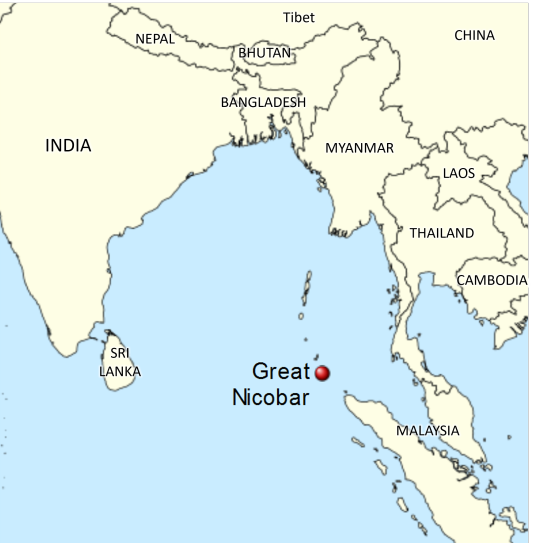
Why is there risk of genocide?
India has announced a huge construction mega-project that will completely change the Great Nicobar Island to turn it into "the Hong Kong of India".
Nowadays, the island has 8,500 inhabitants, and over 95% of its surface is made up of national parks, protected forests and tribal reserve areas. Much of the island is covered by the Great Nicobar Biosphere Reserve, described by UNESCO as covering “unique and threatened tropical evergreen forest ecosystems. It is home to very rich ecosystems, including 650 species of angiosperms, ferns, gymnosperms, and bryophytes, among others. In terms of fauna, there are over 1800 species, some of which are endemic to this area. It has one of the best-preserved tropical rain forests in the world.”
The Indian project aims to destroy this natural environment to create an international shipping terminal with the capacity to handle 14.2 million TEUs (unit of cargo capacity), an international airport that will handle a peak hour traffic of 4,000 passengers and that will be used as a joint civilian-military airport under the control of the Indian Navy, a gas and solar power plant, a military base, an industrial park, and townships aimed at bringing in tourism, including commercial, industrial and residential zones as well as other tourism-related activities.
This project means the destruction of the island's pristine rainforests, as it involves cutting down over 852,000 trees and endangers the local fauna such as leatherback turtles, saltwater crocodiles, Nicobar crab-eating macaque and migratory birds. The erosion resulting from deforestation will be huge in this highly-seismic area. Experts also warn about the effects that this project will have on local flora and fauna as a result of pollution from the terminal project, coastal surface runoff, ballasts from ships, physical collisions with ships, coastal construction, oil spills, etc.
The indigenous people are not only affected because their environment and food source will be destroyed. On top of this, the demographic change will be a catastrophe for them. After the creation of this project, the Great Nicobar Island -which now has 8,500 inhabitants- will receive a population of 650,000 settlers. Remember that the Shompen and Nicobarese people who live on this island are isolated, which means they do not have an immune system that can resist outsider illnesses. Academics believe they could die of disease if they come in contact with outsiders (think of the arrival of Europeans to the Americas after Christopher Columbus and the way that common European illnesses were lethal for indigenous Americans with no immunization against them).
And on top of all of this, the project might destroy the environment and the indigenous people just to turn out to be useless and sooner or later be abandoned. The naturalist Uday Mondal explains that “after all the destruction, the financial viability of the project remains questionable as all the construction material will have to be shipped to this remote island and it will have to compete with already well-established ports.” However, this project is important to India because they want to use the island as a military and commercial post to stop China's expansion in the region, since the Nicobar islands are located on one of the world's busiest sea routes.
Last year, 70 former government officials and ambassadors wrote to the Indian president saying the project would “virtually destroy the unique ecology of this island and the habitat of vulnerable tribal groups”. India's response has been to say that the indigenous tribes will be relocated "if needed", but that doesn't solve the problem. As a spokesperson for human rights group Survival International said: “The Shompen are nomadic and have clearly defined territories. Four of their semi-permanent settlements are set to be directly devastated by the project, along with their southern hunting and foraging territories. The Shompen will undoubtedly try to move away from the area destroyed, but there will be little space for them to go. To avoid a genocide, this deadly mega-project must be scrapped.”
On 7 February 2024, 39 scholars from 13 countries published an open letter to the Indian president warning that “If the project goes ahead, even in a limited form, we believe it will be a death sentence for the Shompen, tantamount to the international crime of genocide.”
How to help
The NGO Survival International has launched this campaign:
From this site, you just need to add your name and email and you will send an email to India's Tribal Affairs Minister and to the companies currently vying to build the first stage of the project.
Share it with your friends and acquittances and on social media.
Sources:
India’s plan for untouched Nicobar isles will be ‘death sentence’ for isolated tribe, 7 Feb 2024. The Guardian.
‘It will destroy them’: Indian mega-development could cause ‘genocide’ and ‘ecocide’, says charity, 8 Feb 2024. Geographical.
Genocide experts call on India's government to scrap the Great Nicobar mega-project, Feb 2024. Survival International.
The container terminal that could sink the Great Nicobar Island, 20 July 2022. Mongabay.
[Maps] Environmental path cleared for Great Nicobar mega project, 10 Oct 2022. Mongabay.
#shompen#genocide#stop genocide#india#indigenous#indigenous peoples#indigenous rights#human rights#anthropology#stateless nations#end occupation#andaman and nicobar islands#nicobar islands#great nicobar#💬#asia#geopolitics#ecocide#sustainability
17K notes
·
View notes
Text


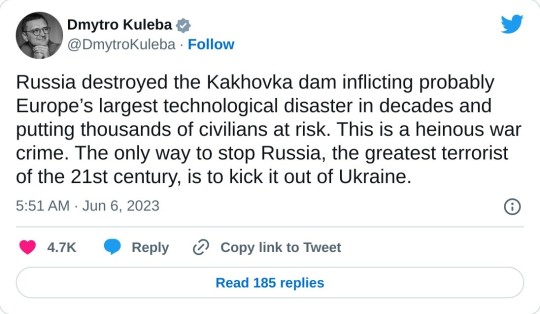
Yes, they have done it, the act of ecocide. It was predicted almost a year ago when it was first reported that the Russians had mined the dam. They've been preparing for it. Over the past few months, they have been draining the reservoir while simultaneously filling all reservoirs in Crimea, because blowing up this dam means no more fresh water supply to Crimea. So everyone who claimed that Russia invaded Ukraine to secure fresh water for Crimea can now go fuck themselves.
Of course they first claimed it was Ukraine's doing. Although some occupiers already happily admit that it was russia who blew it up, and call for blowing up more of Ukraine's infrastructure.
It's typical russian scorched earth tactics. Blowing up the dam can possibly prevent the Ukrainian army landing on the left bank of the Dnipro, and it frees russian troops from the left bank, meaning they can be sent as reinforcement to other front lines, for example, in the Donetsk region.
It is probably the greatest ecological catastrophe since Chornobyl, with thousands of people affected, left homeless, entire villages destroyed probably forever. But the russians don't give two fucks about that. They don't care about any life. Their main objective is not necessarily to claim the land for themselves, but rather to ensure it is not Ukrainian. If they cannot have it, they want to leave it uninhabitable.
Edit: not sure this is a new video, so removed it for now
#Kakhovka HPP#Nova Kakhovka#Ukraine#russian war crimes#ecocide#genocide#russia is a terrorist state#redefining the word terrorism
3K notes
·
View notes
Text
An illegal toxic dump site in Croatia, the theft of water from a major aquifer in southern Spain, illegal trading of ozone-depleting refrigerants in France: This is just a sampling of the environmental crimes that European countries are struggling to stop. The lack of accountability for these acts stems in part from the European Union’s legal code, which experts say is riddled with vague definitions and gaps in enforcement. That’s about to change.
Last week, EU lawmakers voted in a new directive that criminalizes cases of environmental damage “comparable to ecocide,” a term broadly defined as the severe, widespread, and long-term destruction of the natural world. Advocates called the move “revolutionary,” both because it sets strict penalties for violators, including up to a decade in jail, and because it marks the first time that an international body has created a legal pathway for the prosecution of ecocide.
“This decision marks the end of impunity for environmental criminals and could usher in a new age of environmental litigation in Europe,” wrote Marie Toussaint, a French lawyer and EU parliamentarian for the Greens/European Free Alliance group, on X...
The new directive uses the term “ecocide” in its preamble, but does not criminalize the act by laying out a legal definition (the most widely accepted definition of ecocide was developed by an international panel of experts in 2021). Instead, it works by providing a list of “qualified offenses,” or crimes that fall within its purview. These include pollution from ships, the introduction of invasive species, and ozone depletion...
The new law holds people liable for environmental destruction if they acted with knowledge of the damage their actions would cause. This aspect of the law is important, experts said, because it means that a permit is no longer enough for a company to avoid culpability.
“If new information shows that behavior is causing irreversible damage to health and nature – you will have to stop,” a member of the European Parliament from the Netherlands, Antonius Manders, told Euronews.
Advocates like Mehta hope that the EU’s move will have influence beyond Europe’s borders. The principal goal of the Stop Ecocide campaign is for the International Criminal Court to designate ecocide as the fifth international crime that it prosecutes, after crimes against humanity, war crimes, crimes of aggression, and genocide. At the moment, environmental destruction can only be prosecuted as a war crime at the ICC, and limitations in the law make this extremely difficult to do...
Kate Mackintosh, the executive director of the Netherlands-based UCLA Law Promise Institute Europe, told Grist that the ICC is unlikely to adopt an ecocide law if other countries do not do so first.
“It’s not something you can just pull out of thin air,” she said, adding that any international legal doctrine has to have a precedent on the national level. “That’s the way states are going to accept it.”
The EU’s 27 member states will have two years to adapt the new legislation into their penal codes. Afterwards, their implementation must be reviewed and updated at least once every five years using a “risk-analysis based approach,” to account for advancements in experts’ understanding of what might constitute an environmental crime. Mehta said that despite its omission of some important offenses, the law sets an important example for other countries. Several days before the EU vote, Belgium adapted its criminal code to include the directive, making it the first country in Europe to recognize ecocide as a crime.
The ruling “shows leadership and compassion,” Mehta said. “It will establish a clear moral as well as legal ‘red line’, creating an essential steer for European industry leaders and policy-makers going forward.”
-via Grist, March 6, 2024
#climate change#climate crisis#climate catastrophe#climate action#eu#european union#icc#international criminal court#belgium#europe#environment#environmental law#environmental news#ecocide#good news#hope#hope posting
723 notes
·
View notes
Text
The full extent of the damage in Gaza has not yet been documented, but analysis of satellite imagery provided to the Guardian shows the destruction of about 38-48% of tree cover and farmland.
Olive groves and farms have been reduced to packed earth; soil and groundwater have been contaminated by munitions and toxins; the sea is choked with sewage and waste; the air polluted by smoke and particulate matter.
Researchers and environmental organisations say the destruction will have enormous effects on Gaza’s ecosystems and biodiversity. The scale and potential long-term impact of the damage have led to calls for it to be regarded as “ecocide” and investigated as a possible war crime.
[...]
He Yin, an assistant professor of geography at Kent State University in the US, who studied the damage to agricultural land in Syria during the 2011 civil war, analysed satellite imagery showing that up to 48% of Gaza’s tree cover had been lost or damaged between 7 October and 21 March.
As well as direct destruction from the military onslaught, the lack of fuel has led to people in Gaza having to cut down trees wherever they can find them to burn for cooking or heating.
“It’s whole orchards gone, only soil left; you don’t see a single thing,” Yin says.
Independent satellite analysis by Forensic Architecture (FA), a London-based research group that investigates state violence, found similar results.
Before 7 October, farms and orchards covered about 170 sq km (65 sq miles), or 47% of Gaza’s total land area. By the end of February, FA estimates from satellite data that Israeli military activity had destroyed more than 65 sq km, or 38% of that land.
As well as cultivated land, more than 7,500 greenhouses formed a vital part of the territory’s agricultural infrastructure.
Almost a third have been destroyed entirely, according to FA’s analysis, ranging from up to 90% in the north of Gaza to about 40% around Khan Younis.
460 notes
·
View notes
Text
Gaza’s water and sewage treatment facilities also require electricity and fuel. Without them—and with airstrikes ongoing—sewage is flowing into the Mediterranean Sea. According to the Norwegian Refugee Council, more than 130,000 cubic meters of untreated sewage a day were released into the Mediterranean Sea from Gaza in October, with dire consequences for the environment.
These latest developments are pounding Gazan ecosystems that had already been experiencing severe environmental degradation for decades. For instance, while there are some wastewater treatment facilities in the West Bank, the situation was dire in the Gaza Strip even before the current outbreak of violence, because of the Israeli blockade. That blockade has been near total since 2007, and has restricted the entry of materials and fuel needed for infrastructure. Wastewater management infrastructure is outdated, and sewage polluted Gaza’s aquifer and coastal waters. Some 97 percent of Gaza’s water is unsuitable for human consumption, and polluted water is the source of 26 percent of all illnesses—and before the war, the leading cause of child death in the territory.
Poor water quality and quantity are not only a result of Israel’s targeted policies and the unequal distribution of resources. They are also side effects of the destruction of Gaza’s already flimsy infrastructure during rounds of conflict over the last decade and a half. For instance, in 2007, a river of sewage overflowed in the Gazan village of Umm Naser from a collapsed earth embankment, killing five people. Corruption in the Palestinian Authority and Hamas helped cause the disaster, but an even bigger cause was Israel’s massive, sustained bombing attack on Gaza in the summer of 2006, which led to the destruction of sewage treatment facilities and infrastructure in Gaza.
While the 2006 conflict was devastating, it pales in comparison to the current assault. It is estimated that Israel dropped 25,000 metric tons of bombs on Gaza in the first month of this year’s war, a weight equal to the two nuclear bombs (combined) dropped on Hiroshima and Nagasaki in World War II. The bombs have struck 12,000 targets, the majority of which appear to have served a civilian purpose. “
522 notes
·
View notes
Text
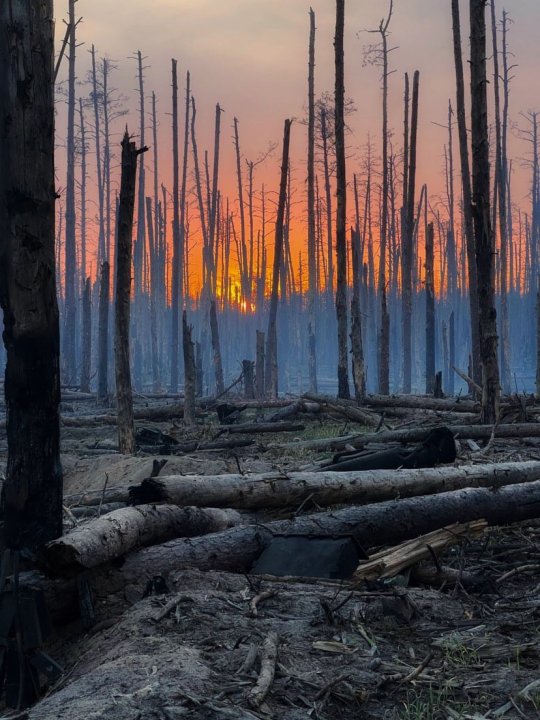
"Happy" belated Earth Day. Here's what russia is doing to Earth.
Serebrianka forest, Ukraine
#ukraine#russia#russia is a terrorist state#genocide#fuck russia#stand with ukraine#support ukraine#genocide of ukrainians#russian war crimes#earth#earth day#nature#ecocide#forest#photography
319 notes
·
View notes
Photo

Imagine waking up in the morning and the first thing you know is that russia committed another war crime/ecocide/crime against humanity. The reservoir cools down Zaporizhzhia Nuclear Power Plant and gives water to the North Crimean Canal (hew, remember how russian claimed that they attacked Ukraine because they needed water to the occupied Crimea?). Hundred of villages and towns will be drowned just in a few hours. Thousands of people will lose their homes.
I can’t even start to describe how vile it is, how angry and heartbroken I am right now.
russia delenda est
#kakhovka hydroelectric power plant#nova kakhovka dam#russian war crimes#russian war in ukraine#ecocide#russia must burn
1K notes
·
View notes
Text
Fuck the assholes who decided to murder trees to spite the WGA:

I was upset before. Now though? Now I'm fucking furious.
We're murdering the planet and these ultra rich assholes decided to kill a bunch of trees in order to increase the likelihood that the people fighting for their rights would get sunburns or heat stroke. They DECIDED to destroy a part of a city, to take away something everyone enjoys, in order to hurt people they'd already victimized.
If I were in LA right now, I'd go on the picket lines just for this. I hope every environmentalist in the fucking state goes there. I hope their goddamn yachts get eaten by orcas and that a comet falls on their bloody private estate and that a tornado sweeps up their shiny new Mercedes and tosses it into their corner office.
Fuck you ecocidal plutocrats.
511 notes
·
View notes
Text
Today russian terrorist forces blew up the Kakhovka Hydroelectric Power Plant in Ukraine’s southern Kherson region on June 6. Large parts of the south of Ukraine are in danger of severe flooding. This is a terrible, barbaric act of ecocide. And russia will pay.
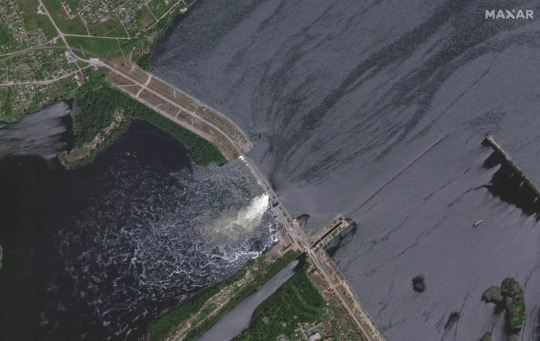
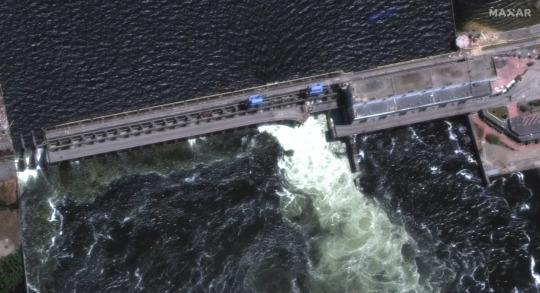
Photo: Maxar, May 28 and May 5
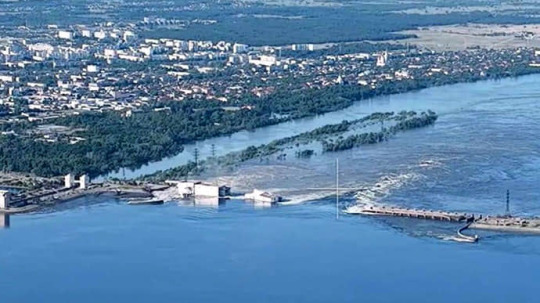
Photo: Energoatom, May 6
#ukraine#украина#україна#russia#россия#росія#putin#путин#путін#война#war#ecocide#ecology#flooding#river#dam#kherson#kakhovka#Херсон#Каховка#дамба#річка#река#екологія#экология#экоцид#екоцид
510 notes
·
View notes
Text
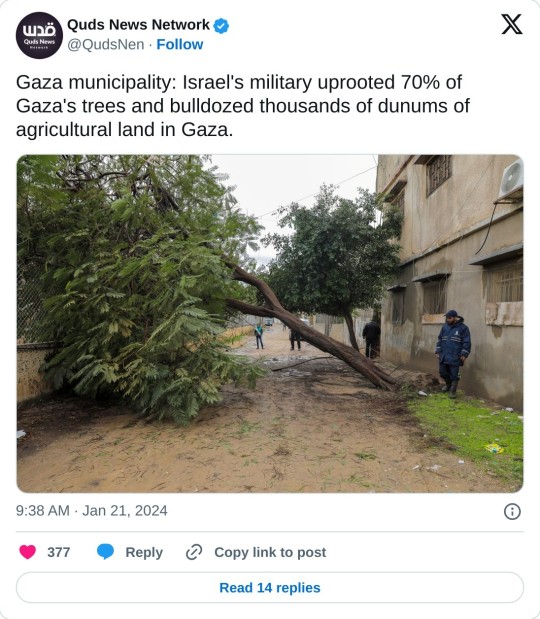
#yemen#jerusalem#tel aviv#current events#palestine#free palestine#gaza#free gaza#news on gaza#palestine news#news update#war news#war on gaza#settler colonialism#ecocide#end the occupation#gaza genocide#genocide
228 notes
·
View notes
Text
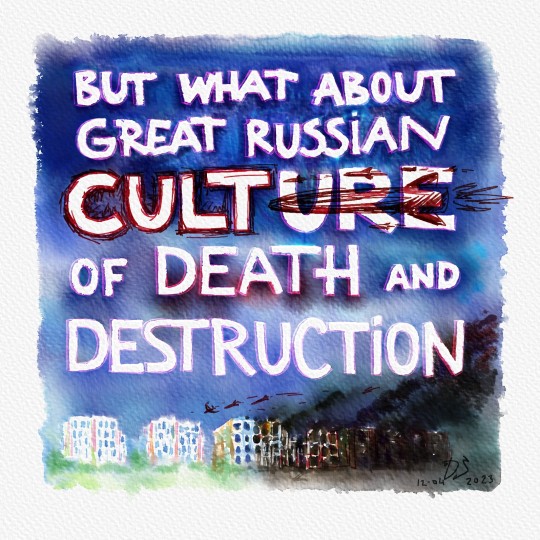
Right now the UN celebrates a "russian language day", while russia just destroyed Kakhovka Hydropower plant dam. Genocide, ecocide, terrorism - all under the banners of "ru culture".
#russia is a terrorist state#genocide#ecocide#crimes against children#crimes against humanity#animal rights#wildlife#flooding#manmade horrors#Kakhovka HPP
458 notes
·
View notes
Text
russians shot animals in the Ecopark like in a shooting range. Many animals had bullet holes right in the middle of their foreheads.
russians destroyed 80% of the buildings there, including the enclosures. Six workers and more than 300 animals were killed.
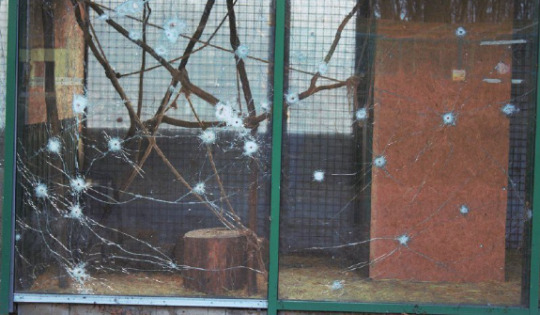
#ukraine#russia is a terrorist state#stand with ukraine#russiainvadedukraine#help ukraine#ukrajina#ukraine war#ecocide#animals#ecopark
382 notes
·
View notes
Text
"On Monday this week [first week of December, 2023], workers in London’s financial centre were met with an unfamiliar sight – and sound. Around 100 chorists, some sporting bowler hats, had gathered at the headquarters of the City’s biggest fossil fuel-backing corporations to sing in protest.
The singers, encompassing a range of generations and vocal pitches, were part of the Climate Choir Movement, a network of choirs that officially launched in January 2023. While world leaders convened at the Cop28 climate summit in Dubai, they raised their voices in support of the Stop Ecocide campaign, which is working to criminalise the destruction of the environment.
The Climate Choir Movement’s co-founder Jo Flanagan first formed a choir in April 2022 with Extinction Rebellion to protest against HSBC’s fossil fuel investments at the bank’s AGM. Dressed smartly to blend in with shareholders, the singers rose up from their seats to disrupt the meeting with a rendition of the Abba classic "Money, Money, Money," the lyrics adapted to urge HSBC to finance renewable energy. [Note: A+ Song choice for this, tbh]
Flanagan had been inspired by a video of US activists singing as a flashmob in the middle of a conference speech to protest against greenwashing. “It made the hairs stand up on the back of my neck,” she recalls. “They walked out of the room in a very dignified way, still singing. I just thought, that’s the way I want to do it.”
Since then, the movement has grown from its first choir in Bristol to 10 choirs across the UK, with around 550 members at the time of writing. The local choirs organise their own rehearsals and protests, while all movement members can attend monthly sessions on Zoom where they learn new songs, to be performed at protests like the one in London.
For Ruth Routledge, who works as a singing for health practitioner and leads the Portsmouth choir in her spare time, taking part in this action was a “wonderful, uplifting” experience. “Singing and harmonising together is a very beautiful way to protest,” she says. “There’s something very gentle, very moving, and very powerful about it. It’s so vulnerable. There’s just a real naked, stripped back humanity that I think cuts through a lot of noise.”
The movement welcomes all new members, regardless of singing ability. Routledge was touched when some passersby – including “a couple of lads” – joined in with the songs.
She is eager for others to experience the sense of hope that singing together brings. “I feel very passionately about the state of the environment. I’m very concerned about my children’s futures, and I’m concerned about the whole world. It keeps me awake at night.
“Joining together means we’re not isolated, worrying that the world is on fire and no one’s going to do anything.”
For Flanagan, what sets the movement apart from other choirs that sing songs about nature is its targeted approach. “We organise very carefully choreographed, peaceful performance protests. We want to change hearts and minds.”
Seeing onlookers in tears illustrates to her what singing can achieve. “It reaches deep inside people in a way that other forms of protest can’t.”"
-via Positive.News, December 6, 2023
#climate news#climate protest#climate hope#hopepunk#singing#abba#bristol#london#uk#big bank billionaires#fossil fuels#climate change#climate crisis#direct action#protest#activism#climate activism#climate choir#ecocide#choir#choir stuff#protest songs#protest music#protest art#good news#hope
178 notes
·
View notes
Text
Museum and home of famous Ukrainian painter flooded

The home of famed Ukrainian painter Polina Raiko is under water as a result of the Kakhovka dam destruction.
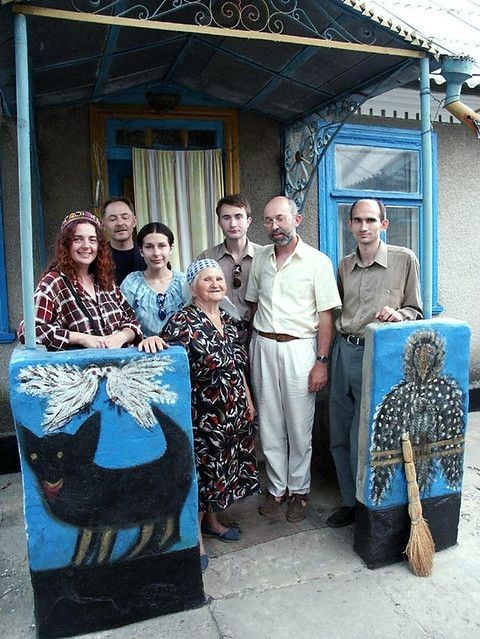







Polina Raiko was a self-taught painter and an important figure in Ukrainian naïve artistry. Raiko passed away in 2004 at the age of 75 but her home became a museum and a national cultural monument of Ukraine.
#kherson is ukraine#kherson#russia blew up the dam#ecocide#ecological catastrophe#ecology#ukrainian culture#ukraine#ukrainians#museum#museum in ukraine#art in ukraine#ukrainian art#museum under water#russia war criminal#russia war crimes#war in ukraine#stand with ukraine#pray for ukraine#ukraine under attack#war#pray for ukrainians#stop war#pray for ukrainian soldiers#ukrainians on tumblr#kakhovska dam#kakhovska dam destruction#naive art#naive painting#naive artist
480 notes
·
View notes